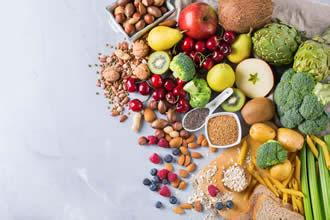PrecisionDPC offers primary care medical services. And a whole lot more!

- posted: Dec. 29, 2020
They say, “You are what you eat!" So, what does your diet say about you? Whether you’ve noticed that you are eating more sugar than usual these days and want to curb those cravings, or you want to give your diet a complete revamp, your general medical practitioner can provide you with helpful tips catered to your specific health and needs. Eat healthier, eat smarter. Here’s how:
Stay Away from Sugar
We all know that consuming sugar can have some pretty ill effects on our health. Sugar can lead to inflammation, which can also create a hospitable environment for disease. That’s because the foods we eat talk to our genes. So, grabbing that donut in the morning instead of making a nutrient-dense meal could increase your risk for certain diseases. Your doctor can provide you with helpful tips to help you kick your addiction to sugar. Trust us; it’s worth it!
Choose Real Foods
When we talk about “real food” we are talking about avoiding processed foods. This means that instead of reaching for that frozen meal or prepackaged dinner that you choose ingredients such as grass-fed meats, free-range organic eggs, and organic or locally grown vegetables and fruits. Avoid any highly processed foods with artificial ingredients. If you’re a seafood eater, it’s recommended that you choose wild-caught over farm-raised.
Know-How to Read Food Labels
It’s surprising how many people don’t even check nutrition labels before purchasing an item. You don’t even know what preservatives, sweeteners, and artificial ingredients you’re consuming if you aren’t reading your food labels. Here are some tips to help demystify what food labels are trying to tell you,
- Check the serving size of the product and pay attention to how many servings there are in one package.
- Determine the number of calories you would be consuming in a single serving.
- Know that the percent Daily Values (DV) refers to an average 2,000 calorie diet. For example, a product that contains 20 percent Daily Values of carbs provides the person with 20 percent of the total carbs that a person who is adhering to a 2,000-calorie diet should consume in a day.
Here are some other helpful tips from the medical experts on what food labels are trying to tell you about certain products. It could help make you a more health-conscious and savvy shopper the next time you’re at the grocery store.
Say Yes to Slow Carbs
Yes, vegetables also contain some carbs, but this doesn’t mean you should avoid them. On the contrary, they are different from fast-releasing carb sources like white bread and white rice. These carbs are known as slow carbs. They have a low glycemic index and include veggies such as broccoli, asparagus, Brussel sprouts, mushrooms, kale, and cauliflower. Slow-release carbs can help satiate your appetite faster and help you stay fuller longer. Plus, veggies are chock full of vitamins, nutrients, and antioxidants, so it’s really a win-win.
A healthy diet can go a long way to preventing disease and helping you lead a long, healthy life. Of course, there isn’t a one-size-fits-all approach to the perfect diet. Your general medicine doctor can help guide you in making healthier food choices that actually stick.
Our Location
Our office is centrally located in Denton, Texas.
Office Hours
Precision Direct Primary Care
9:00 am - 5:00 pm
9:00 am - 5:00 pm
9:00 am - 5:00 pm
9:00 am - 5:00 pm
9:00 am - 5:00 pm
Closed
Closed


